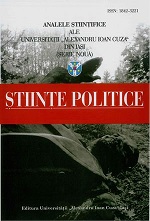Trei perspective asupra tiraniei
Three approaches to tyranny
Author(s): Bogdan Constantin MihailescuSubject(s): Politics / Political Sciences
Published by: Editura Universităţii »Alexandru Ioan Cuza« din Iaşi
Keywords: foundationalism; liberty; liberalism; postmodernism; tradition; tyranny; virtue
Summary/Abstract: In the history of the political thought, the manner of rejecting tyranny differs very much. For the traditional perspective, tyranny alters, till complete destruction, the moral dimension of the society, deterring people to evolve and, therefore, to be free. By this vision, tyranny is, above all, an attack against the community and a renunciation of the virtue. For the classical liberalism, tyranny is the gravest form of estranging from the basis of the legitimate politics, being firstly an attack against the individual, against his status of free person, of rational and moral autonomous agent, and a stepping out of the universal natural justice. For the non-foundationalist approaches, specific to the postmodern liberalism, tyranny is the confirmation of the historical evil, represented by the opacity and the insensibility of the political power toward the suffering. According to this particular way of understanding the world, tyranny is, when it's seen by the lens of the liberal values, a political act of major cruelty, an attack against the peace and an abandoning of the experience and of the practice of the liberty, an enthronement of the horror and of the torture.
Journal: Analele Ştiinţifice ale Universităţii »Alexandru Ioan Cuza« din Iaşi. Ştiinţe politice
- Issue Year: 2013
- Issue No: 8
- Page Range: 87-100
- Page Count: 13
- Language: Romanian
- Content File-PDF

